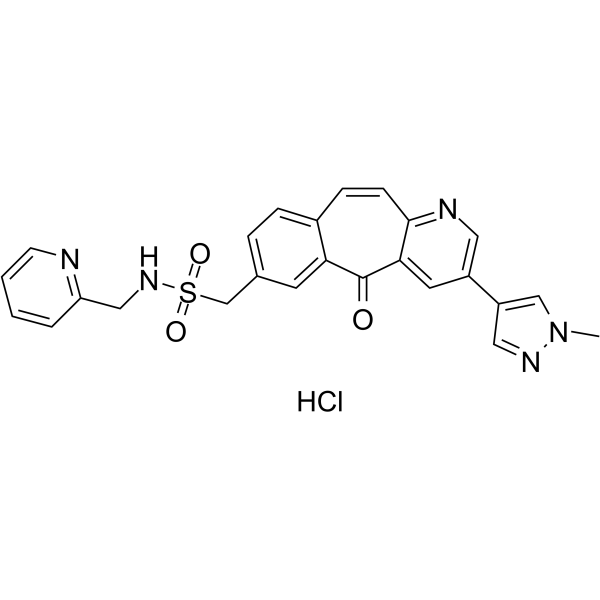产品
编 号:F109160
分子式:C25H22ClN5O3S
分子量:507.99
分子式:C25H22ClN5O3S
分子量:507.99
产品类型
规格
价格
是否有货
2mg
询价
询价
5mg
询价
询价
10mg
询价
询价
结构图

CAS No: 1283000-43-0
产品详情
生物活性:
MK-8033 hydrochloride is an orally active ATP competitive c-Met/Ron dual inhibitor (IC50s: 1 nM (c-Met),7 nM (Ron)), with preferential binding to the activated kinase conformation. MK-8033 hydrochloride can be used in the research of cancers, such as breast and bladder cancers, non-small cell lung cancers (NSCLCs).
体内研究:
MK-8033 hydrochloride (Compound 11r, oral administration, 3-100 mg/kg, twice daily for 21 days) inhibits tumor growth in GTL-16 c-Met amplified gastric tumor xenografts.MK-8033 hydrochloride exhibits moderate clearance (t1/2: 0.8 h for rats, 3.1 h for dog) and favorable bioavailability (35% for rats, 33% for dog).Animal Model:Human GTL-16 c-Met amplified gastric tumor xenografts
Dosage:3, 10, 30, and 100 mg/kg
Administration:Oral administration, twice daily for 21 days
Result:Resulted in 22, 18, 57, and 86% tumor growth inhibition at 3, 10, 30, and 100 mg/kg, respectively.Inhibited c-Met (Y1349) phosphorylation.
体外研究:
MK-8033 hydrochloride (Compound 11r, 10 μM) displayed 31% inhibition of CYP3A4 (cytochrome P450 3A4).MK-8033 hydrochloride (1 μM, 2 h) inhibits phosphorylation of Y1349 of c-Met (IC50: 0.03 μM) in the c-Met dependent gastric cancer cell line GTL-16.MK-8033 hydrochloride (1-10 μM, 72 h) inhibits GTL-16 cell proliferation (IC50: 0.58 μM).MK-8033 hydrochloride binds more tightly to phosphorylated c-Met (Kd: 3.2 nM) than to its unphosphorylated counterpart (Kd: 10.4 nM), and inhibits oncogenic c-Met activation loop mutants with IC50s ranging from 0.6 to 1 nM. MK-8033 hydrochloride (0.1-10 μM, 2 h) reduces the phosphorylation of c-Met, ERK, and Akt in EBC-1 and H1993 cells.MK-8033 hydrochloride (1 μM, 1 h) sensitizes EBC-1 and H1993 cells (high c-Met-expressing) to radiation.MK-8033 hydrochloride (10 μM, 6 h) enhances γ-H2Ax levels in A549 cells compared to double irradiation and decreases in DNA repair.MK-8033 hydrochloride (2 μM, 72 h) results in reduced cell proliferation, but modest induction of apoptosis in G-alpha protein mutant UM (uveal melanoma) cells.
MK-8033 hydrochloride is an orally active ATP competitive c-Met/Ron dual inhibitor (IC50s: 1 nM (c-Met),7 nM (Ron)), with preferential binding to the activated kinase conformation. MK-8033 hydrochloride can be used in the research of cancers, such as breast and bladder cancers, non-small cell lung cancers (NSCLCs).
体内研究:
MK-8033 hydrochloride (Compound 11r, oral administration, 3-100 mg/kg, twice daily for 21 days) inhibits tumor growth in GTL-16 c-Met amplified gastric tumor xenografts.MK-8033 hydrochloride exhibits moderate clearance (t1/2: 0.8 h for rats, 3.1 h for dog) and favorable bioavailability (35% for rats, 33% for dog).Animal Model:Human GTL-16 c-Met amplified gastric tumor xenografts
Dosage:3, 10, 30, and 100 mg/kg
Administration:Oral administration, twice daily for 21 days
Result:Resulted in 22, 18, 57, and 86% tumor growth inhibition at 3, 10, 30, and 100 mg/kg, respectively.Inhibited c-Met (Y1349) phosphorylation.
体外研究:
MK-8033 hydrochloride (Compound 11r, 10 μM) displayed 31% inhibition of CYP3A4 (cytochrome P450 3A4).MK-8033 hydrochloride (1 μM, 2 h) inhibits phosphorylation of Y1349 of c-Met (IC50: 0.03 μM) in the c-Met dependent gastric cancer cell line GTL-16.MK-8033 hydrochloride (1-10 μM, 72 h) inhibits GTL-16 cell proliferation (IC50: 0.58 μM).MK-8033 hydrochloride binds more tightly to phosphorylated c-Met (Kd: 3.2 nM) than to its unphosphorylated counterpart (Kd: 10.4 nM), and inhibits oncogenic c-Met activation loop mutants with IC50s ranging from 0.6 to 1 nM. MK-8033 hydrochloride (0.1-10 μM, 2 h) reduces the phosphorylation of c-Met, ERK, and Akt in EBC-1 and H1993 cells.MK-8033 hydrochloride (1 μM, 1 h) sensitizes EBC-1 and H1993 cells (high c-Met-expressing) to radiation.MK-8033 hydrochloride (10 μM, 6 h) enhances γ-H2Ax levels in A549 cells compared to double irradiation and decreases in DNA repair.MK-8033 hydrochloride (2 μM, 72 h) results in reduced cell proliferation, but modest induction of apoptosis in G-alpha protein mutant UM (uveal melanoma) cells.
产品资料

